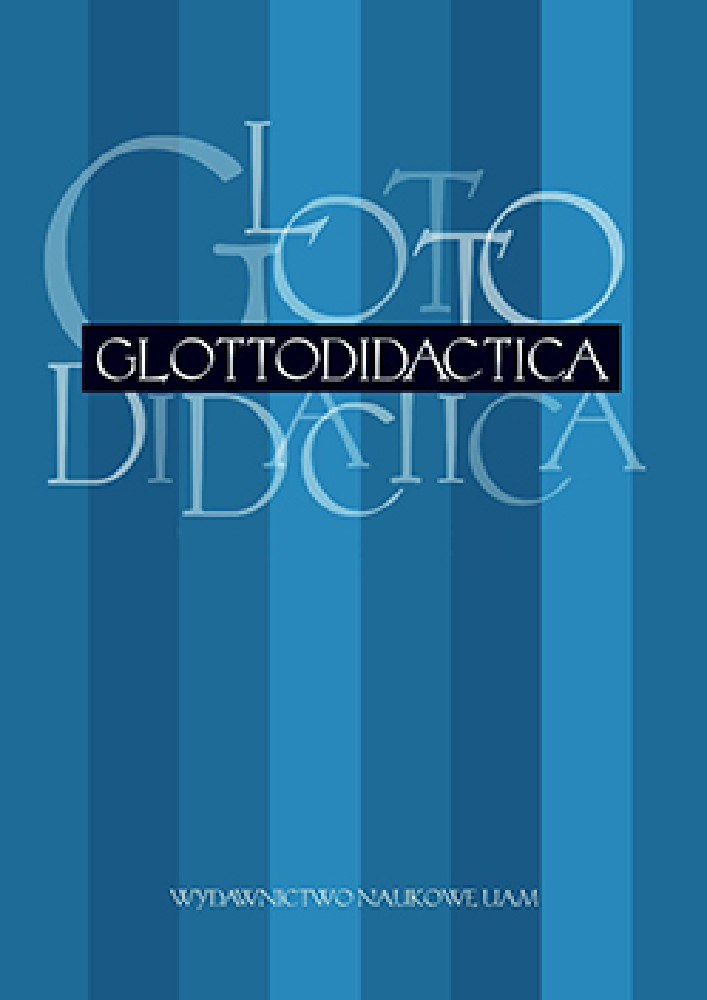Abstract
This paper attempts to highlight the significant multidimensional role of teachers of English as a foreign language in conducting language assessment in the process of teaching. The study presented in the article aimed to investigate school and university EFL teachers’ (n=87) beliefs about the place of assessment in their teaching practice and their role as assessors. The findings indicated that classroom assessment, though appreciated by the study participants, posed a major challenge to them.References
Bachman, L. F., 2008. Language assessment: opportunities and challenges. Retrieved from the Web Oct 27, 2008, <http://www.aaal.org/index.php?id=48>.
Black, P., 2009. Formative assessment issues across the curriculum: the theory and the practice. In: TESOL Quarterly 43/3, 519–524.
Brown, H.D., 2004. Language Assessment. Principles and Classroom Practices. New York: Pearson Education.
Bullock, D., 2011. Learner self-assessment: an investigation into teachers’ beliefs. In: ELT Journal 65/2, 114–125.
Cheng, L., Rodgers, T., Hu, H., 2004. ESL/EFL instructors’ classroom assessment practices: purposes, methods, and procedures. In: Language Testing 21/3, 360–389.
Cumming, A., 2009. Language assessment in education: tests, curricula, and teaching. In: Annual Review of Applied Linguistics 29, 90–100.
Czetwertyńska, G., 2005. Konstruktywizm a ocenianie kształtujące. In: Języki Obce w Szkole 6/2005, 16–19.
Davison, C., Leung C., 2009. Current Issues in English Language Teacher-Based Assessment. In: TESOL Quarterly 43/3, 393–415.
Falsgraf, C., 2009. The ecology of assessment. In: Language Teaching 42/4, 491–503.
Fulcher, G., Davidson, F., 2007. Language Testing and Assessment: An Advanced Resource Book. New York: Routledge.
Genesee, F., Upshur, J.A., 1996. Classroom-based evaluation in second language education. New York: Cambridge University Press.
Komorowska, H., 2002. Sprawdzanie umiejętności w nauce języka obcego: kontrola, ocena, testowanie. Warszawa: Fraszka Edukacyjna.
Lantolf, J.P., 2009. Dynamic assessment: The dialectic integration of instruction and assessment. In: Language Teaching 42/3, 355–368.
Leung, C., 2005. Classroom teacher assessment of second language development: construct as practice. In: Hinkel, E. (ed.). Handbook of research in second language learning and teaching. Mahwah, NJ: Lawrence Earlbaum, 869–888.
Leung, C., Lewkowicz, J., 2006. Expanding Horizons and Unresolved Conundrums: Language Testing and Assessment. In: TESOL Quarterly 40/1, 211–234.
Llosa, L., 2011. Standards-based classroom assessments of English proficiency: A review of issues, current developments, and future directions for research. In: Language Testing 28/3, 367–382.
McNamara, T., Roeven, C., 2006. Language testing: the social dimension. Oxford: Blackwell Publishing.
Mok, J., 2011. A case study of students’ perceptions of peer assessment in Hong Kong. In: ELT Journal 65/3, 230–239.
Piegzik, W., 2005. Ocenianie osiągnięć uczniowskich na lekcjach języków obcych. In: Języki Obce w Szkole 6/2005, 75–83.
Poehner, M.E., 2009. Group dynamic assessment: mediation for the L2 classroom. In: TESOL Quarterly 43/3, 471–491.
Rea-Dickins, P., 2004. Understanding teachers as agents of assessment. In: Language Testing 21/3, 249–258.
Rea-Dickins, P., 2006. Currents and eddies in the discourse on assessment: a learning-focused interpretation. In: International Journal of Applied Linguistics 16/2, 163–188.
Shohamy, E., Inbar, O., 2006. Assessment of advanced language proficiency: Why performance-based tasks? (CALPER Professional Development Document 0605). University Park, PA: The Pennsylvania State University, Center for Advanced Language Proficiency Education and Research.
Shohamy, E., Inbar-Lourie, O., Poehner, M., 2008. Investigating assessment perceptions and practices in the advanced foreign language classroom (Report No. 1108). University Park, PA: Center for Advanced Language Proficiency Education and Research.
Zawadzka, E., 2004. Nauczyciele języków obcych w dobie przemian. Kraków: Oficyna Wydawnicza „Impuls”.
License
Authors
Authors of texts accepted for publication in Glottodidactica are required to complete, sign and return to the Editorial team’s office the Agreement for granting a royalty-free license to works with a commitment to grant a CC sub-license.
Under the agreement, the authors of the texts published in Glottodidactica grant Adam Mickiewicz University in Poznań a non-exclusive, royalty-free license and authorize the use of Attribution-NoDerivatives 4.0 International (CC BY-ND 4.0) Creative Commons sub-license.
The authors retain the right to the free disposal of the work.
Users
Interested Internet users are entitled to use works that have been published in Glottodidactica since 2016, under the following conditions:
▪ attribution – obligation to provide, together with the distributed work, information about the authorship, title, source (link to the original work, DOI) and the license itself.
▪ no derivatives – the work must be preserved in its original form. Without the author's consent, it is not possible to distribute the modified work in the form of translations, publications, etc.
Copyrights are reserved for all texts published before 2016.
Miscellaneous
Adam Mickiewicz University in Poznań retains the property right as a whole (layout, graphic form, title, cover design, logo etc.).
Privacy statement
The names and email addresses published on this journal site will be used exclusively for the purposes declared by this journal and cannot be used for any other purpose or by any other party.




